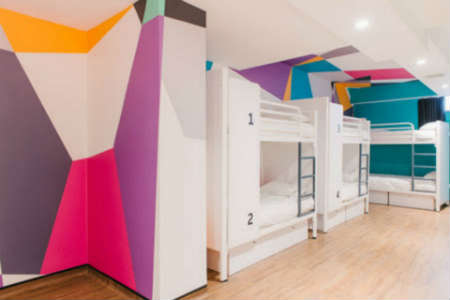CITY
‘Poshtels’ – hostels with stylish design, private-room options and other luxury touches – are arriving in droves across British cities. In north London, for instance, the industrial-chic Generator hosts art installations and has its own cinema amid the reclaimed timbers and hot-rolled black steel. Private twin rooms begin at £52 and the BritishMuseum is five minutes away. http://generatorhostels.com
Elsewhere, Hoax is Liverpool’s sharpest poshtel thanks to a downstairs creative space, bold colour splashes and the street food-serving HOPSKOTCH bar. Private doubles start from £45. Or there’s Cardiff’s new Safehouse, a converted Victorian building where shared rooms contain deluxe bunks made by a local craftsman. Memory foam mattresses, parquet floors, Wi-Fi, free breakfasts and complimentary walking tours of the Welsh capital clinch it: at a starting price of £18 a night, these dorms are a steal. http://hoaxliverpool.com,www.safehousehostel.co.uk
As are a collection luxury boutiques with tiny prices. Two minutes from Tate Britain, London’s Citizen M Bankside has artsy live-in lounges dotted with iMacs, “absolutely no trouser presses, bellboys or stupid pillow chocolates,” and double rooms costing as little as £109.www.citizenm.com
Other ‘low-cost, high-style’ design-hotel chains include Tune (with options in Newcastle, Edinburgh and across London), Hub (Central London) and Qbic (East London). www.tunehotels.com,www.hubhotels.co.uk, www.qbichotels.com
Then there’s Village Urban Resorts, now up to almost 30 UK outposts thanks to recent Scottish openings in Glasgow and Edinburgh. Designed in an eye-catching ‘black box’ style, each boasts a state-of-the-art gym, a large indoor pool, extensive dining options and, in most cases, a Starbucks. Just over half also have a luxurious spa. Stay in a double room at the Village Urban Resort in Bournemouth, on Britain‘s south coast and two hours by train from London Waterloo, for £79.www.village-hotels.co.uk
COUNTRYSIDE
A time-honoured cost-cutting option, self-catering properties proliferate around the British countryside, where visitors get more space for their spend. Hunt for somewhere with a decent kitchen and then purchase food at markets and local shops to dodge the expense of eating out every night. For a truly quirky rental, try The Landmark Trust, which restores historic buildings before making them available for hire.www.landmarktrust.org.uk
Various bijou country hotels also offer outstanding value. Up in western Scotland, 60 miles and two hours northwest of Glasgow, the 300-year-old Clachaig Inn in Glencoe has 23 double rooms starting at only £47, and where you can experience hearty Highlands food, live music, a malt whisky bar and cosy log fires. http://www.clachaig.com
Based on user reviews over the past 12 months, TripAdvisor’s 2015 Travellers’ Choice awards include a ‘Top Bargain Hotels – World’ section. Topping that is the Lawton Court Hotel in Llandudno, northern Wales – a 70-mile drive west from Liverpool – with praise reserved for its service, seafront location, food and £77 rooms. In third place was the Queen’s Promenade Hotel in north western England’s seaside town Blackpool, an hour north of Liverpool. Doubles start at £50. www.lawtoncourt.co.uk, www.queenspromenadehotel.com.
A vintage way to ‘do’ the British countryside is via a bed-and-breakfast: often family-run, these establishments typically provide excellent value, homemade meals and personalised service. Two British stand-outs headlined TripAdvisor’s ‘Top 25 B&B & Inns – World’ category: Millgate B&B (rooms from £76 with breakfast) in the northern market town of Masham, an hour north of Leeds, came top overall, while the Shola Coach House (from £45 with breakfast), in coastal Portrush, Northern Ireland – close to Giant’s Causeway, and two hours’ drive west from Belfast – was runner-up. www.millgate-masham.co.uk,www.sholabandb.com
TIPS
Getting value in Britain isn’t just about staying somewhere affordable, though: the question of when you stay is just as crucial. In locations chiefly catering to tourists, such as York or the Lake District, many hotels spike their prices on weekends. But in more business-focused towns, such as the Scottish city of Aberdeen, it’s the reverse, andtourists commonly pay less to stay on a Saturday or Sunday.
In London, this applies to different parts of town: accommodation in areas like Mayfair or the City drop their prices on weekends (with deals common), while Bayswater, Kensington and West End residences mostly have lower midweek rates. If you visit over a weekend, searching for a ‘business hotel’ is a savvy first step.
In terms of seasonality, January and February are the cheapest months to travel to Britain. Unlike other European cities, cities like London or Manchester don’t tend to empty over summer; rather, July or August are considered peak time. Bank holiday weekends – one at either end of May, one in late-August – see prices rise, as do Valentine’s Day (14 February), Christmas and the New Year.
OUTSIDE THE BOX
Of course, it doesn’t have to be a hotel, hostel, B&B or rental property. During holiday periods, many British universities open up their halls of residence to visitors. As well as a collegiate feel and comfort, these digs offer a choice of bed-and-breakfast, half-board and self-catering accommodation. Check individual university websites or visitwww.universityrooms.com.
Finally, with thousands of campsites, Britain is a dream for the cost-cutting canvas-lover. Among the most scenic options are Cleadale, on the tiny Isle of Eigg in western Scotland’s Inner Hebrides – reached by ferry from Mallaig, a three-hour drive north from Glasgow – whose magical setting inspired JRR Tolkien’s stories, and The Secret Campsite in Sussex, southern England: 15 pitches accessed only via an ancient railway footbridge, and an hour’s train-ride from London. Both cost from £5 per tent per night. www.eiggorganics.co.uk,www.thesecretcampsite.co.uk

